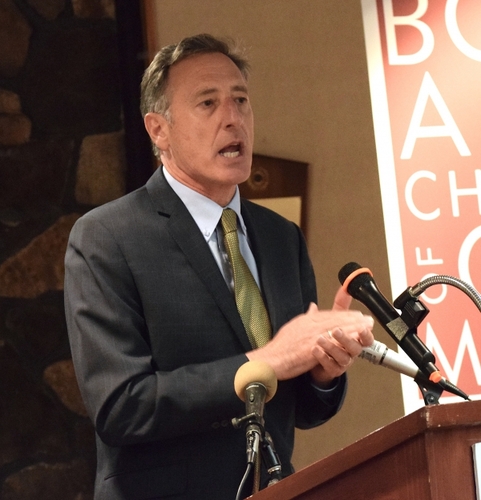BRATTLEBORO — Back on home turf for one final “lunch with the governor” event, Gov. Peter Shumlin got an honorary Brattleboro Area Chamber of Commerce membership and a chance to defend his six-year record as the state's chief executive.
Speaking April 11 at American Legion Post 5 in Brattleboro, the Putney native touted accomplishments in economic development, energy, education, health care, and agriculture. He said he has served in “a remarkable time” and hasn't “shied away from the tough fights.”
Shumlin addressed a supportive crowd and took just one skeptical question - an inquiry about his push for marijuana legalization.
Just a few days after that effort was dealt a blow in the House Judiciary Committee, Shumlin declared that legalization opponents are taking a too-timid approach to an obvious problem.
“We can live in denial, like we did on heroin and opiate addiction and all the rest. It didn't go so well for us,” Shumlin said. “Or we can move to a more-sensible policy. I think the Senate passed a very sensible bill. I think the sooner we pass it, the better off Vermonters are going to be.”
Getting to yes
Shumlin appeared at the Legion with House Speaker Shap Smith. Both men are stepping down from their positions at the end of 2016 and offered different versions of a farewell speech.
Having served as speaker for eight years, Smith noted a relatively good working relationship between the Legislature and the Shumlin administration.
“It's not that we haven't had our disagreements. But it is incumbent on those branches of government to figure out how you can resolve those disagreements,” Smith said. “Peter and I have always had a line of communication open so that, when we were having challenges, we could figure out a way to get to 'yes.'”
Shumlin returned the complement - but he seemed more concerned about the way his administration's record is perceived by constituents and portrayed by the press.
He spoke of a “new era of cynicism about public service” that is “more like what happened after Watergate [...] than anything I've seen in my lifetime.”
He urged the crowd to instead “celebrate, a little bit, where we are in Vermont.” And then he launched into a list of accomplishments on a variety of topics:
• Shumlin said he believes Vermont's economy has made “real progress,” citing job creation and one of the nation's lowest unemployment rates. In Brattleboro, he cited projects such as the retention of G.S. Precision's manufacturing plant and the renewal of downtown's Brooks House complex - both of which Shumlin had a hand in.
• The governor again highlighted his longstanding opposition to the now-defunct Vermont Yankee nuclear power plant. He said he has delivered on his promise to boost renewable-energy production, adding that renewables have created jobs even as electricity rates have been reduced.
He mimicked and derided critics of his energy policies. “'Shumlin's moving too fast. Slow it down. Let's slow down renewables. I don't like what a solar panel looks like,'” he said. 'I'm like, 'Are you guys kidding me?'”
The governor also made a passing reference to wind power, as a proposed 28-turbine development that could be the state's largest has spurred controversy in his home county.
“I know some people don't like it,” Shumlin said. “But it's one of the cleanest renewables and most-efficient around.”
• Shumlin said Vermont has made strides in expanding pre-kindergarten, early college, and dual enrollment programs. Also, both he and Smith defended Act 46, though the school-governance law has led to sometimes contentious merger discussions both in Windham County and around the state.
“We've got communities sitting down and having the tough conversations, finally,” Shumlin said.
• Shumlin acknowledged the persistent, ongoing technical problems with Vermont's online health-care exchange. “I have had the living crap beat out of me on health care,” he said.
But the governor blamed a lack of technological know-how rather than any administrative issues.
“When Congress passed the Affordable Care Act, the appetite for technology was more exuberant than the ability of any technology provider in America,” Shumlin said.
“The press won't write it this way, because it's not sexy,” he added. “But whether you're President Obama building a federal exchange, or Pete Shumlin building a state exchange, or every other governor in America who decided to build their own exchange, nobody could deliver on the exuberance of the [implementation] deadline.”
Shumlin pledged to fix Vermont Health Connect before he leaves office but also asked the crowd to “forget websites for a second.” Rather, he wanted listeners to know that “Vermont embraced the Affordable Care Act,” and as a result, many more residents are insured than had been before.
• On marijuana, a member of the audience expressed concern about enforcing drug-free workplace policies and impaired-driver laws if the drug is legalized. But Shumlin said that question is missing critical context.
“If you employ people in Vermont, lots of them? Chances are, you've got people at work, high, right now,” Shumlin said, adding that “Vermont has, statistically, among the highest pot consumption in America.”
The state House Judiciary Committee on April 8 approved legislative language that scraps pot legalization; in its place are measures including formation of a commission to study marijuana issues in Vermont.
But the governor said legalizing and regulating marijuana - as the Senate initially proposed in a bill approved in February - is the best way to face the issue “head on.”
Shumlin also sought to turn the conversation back to opiate abuse, a topic he has made a centerpiece of his agenda.
“When you see heroin in downtown Brattleboro and you see heroin in downtown Burlington, trust me, it is not pot that led to that,” Shumlin said. “It is FDA-approved, big-pharma-promoted, legal drugs - pills that then drive users and addicts to the cheaper and more pure version, which is heroin.”
“Make no mistake about it,” he said. “That is our problem in Vermont.”
